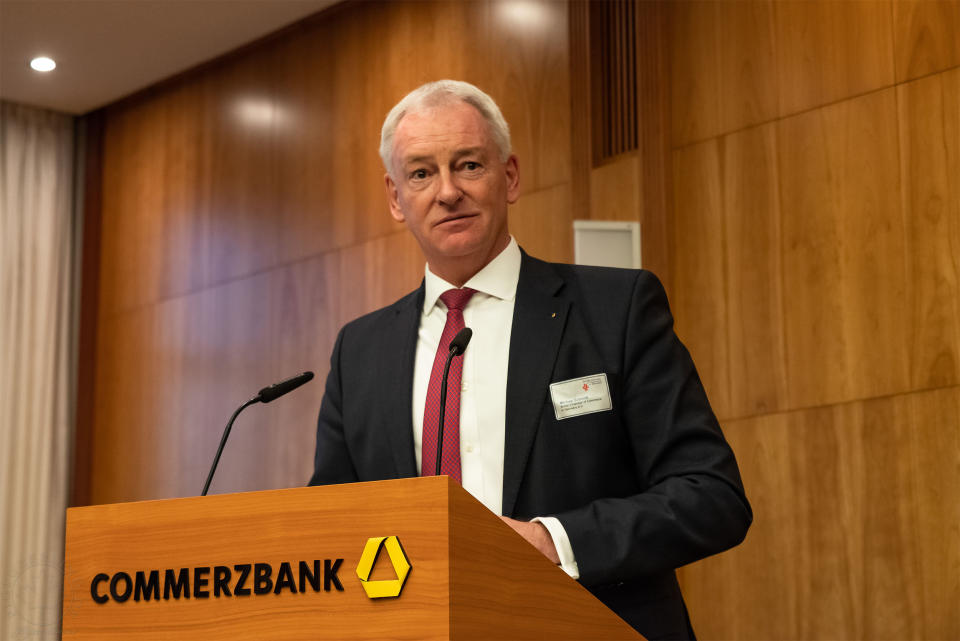‘A nightmare for companies’: President of British Chamber of Commerce in Germany discusses Brexit

Brexit was front-and-centre as the British Chamber of Commerce in Germany (BCCG) celebrated its 100th anniversary in Berlin on Thursday.
BCCG president Michael Schmidt said that Brexit has drawn the German and British business communities closer — one of the few positives in the current climate of uncertainty and anxiety. As Britain’s second-largest trading partner, with bilateral trade topping €180bn (£156bn) in 2017, the relationship between Germany and the UK will remain significantly important post-Brexit.
Schmidt spoke to Yahoo Finance UK about managers vs. politicians, how the role of the chamber has intensified, and the risk of dangerous “legends” arising around Brexit.
This interview has been edited for brevity.
Yahoo Finance UK: Has Brexit had a noticeable effect on the role of the British Chamber of Commerce in Germany?
Michael Schmidt: As long as trade relationships between different geographies work smoothly there is no significant need for a kind of organisation such as ours. We answer questions and build networks, but it’s a normal steady business. In terms of Brexit you get a lot of attention, you get a lot of questions, and the visibility and the importance of the BCCG in Germany has increased. We see this in terms of requests from our members… and the general interest of not just our members in other companies, but also the wider public. I would say in a year where we celebrate the 100th anniversary, it’s the only good thing in a bad situation.
YFi UK: Airbus CEO Tom Enders said this week that it is a “disgrace” how the government handling of Brexit means businesses haven’t been able to plan ahead. Would you agree?
MS: As far as the consequences are concerned, I think it is a disgrace. The vast majority of parliamentarians have voted against [prime minister] Theresa May’s deal all for different reasons. There are so many different agendas being followed that it is very hard to detect where a common solution may lie. It’s a nightmare for companies simply because they cannot prepare for it, and if you want to prepare for all the different options which are still feasible, you don’t have the resources for that, particularly smaller companies.
YFi UK: What is the best-case Brexit scenario now, given we’re running out of time?
MS: The best scenario from my point of view would be if our British friends decided to stay in the European Union. Is it likely? Not really. So I fully accept the vote, but given the options on the table now, I would say if you want to avoid an Irish border you need to stay in the customs union. But to be honest it’s guessing, I don’t know.
YFi UK: Would an extension of the withdrawal date beyond March 29 solve anything?
MS: If you have more time, you have more opportunities to look for majorities. The big difference between managers and politicians is managers are looking for the best solution; politicians are looking for a majority, that doesn’t necessarily mean the same.
YFi UK: The title of today’s BCCG discussion is “Brexit: entrepreneurial chance or deep uncertainty.” The deep uncertainty is obvious, so what opportunities could Brexit bring?
MS: I cannot see a real benefit. From my perspective it is wishful thinking to find better trade agreements than the EU has, given the re-nationalisation we are observing across the globe and the changed dynamics and politics in the US, it’s quite unlikely that you find a better deal.
What really strikes me, and this is not just my personal view, but also that of the British Chamber of Commerce in Germany, is that we already have trenches between UK and continental Europe and these are deepening. We are already starting to look for scapegoats… was it [Angela]Merkel not listening to [David] Cameron? Is it the EU treating the British negotiator badly? Legends are going to develop and this is one of the serious risks I see.
In terms of trade, we are mostly likely facing a phase of changes, you may call that chaos, but after a certain period of time this will be transferred into a steady mode, where we have steady agreements in place. This is the most important task — to find an agreement on how we can and want to deal with each other in the future. The relationship between the two partners needs to be maintained even after Brexit. It’s not a given, we need to work on it.

 Yahoo Finance
Yahoo Finance 